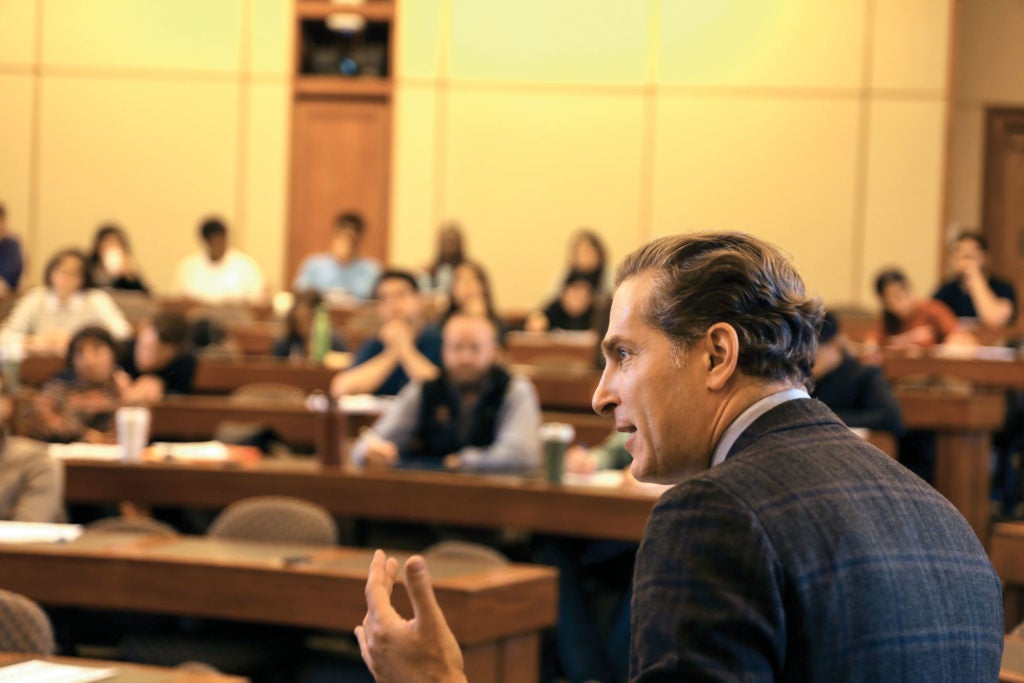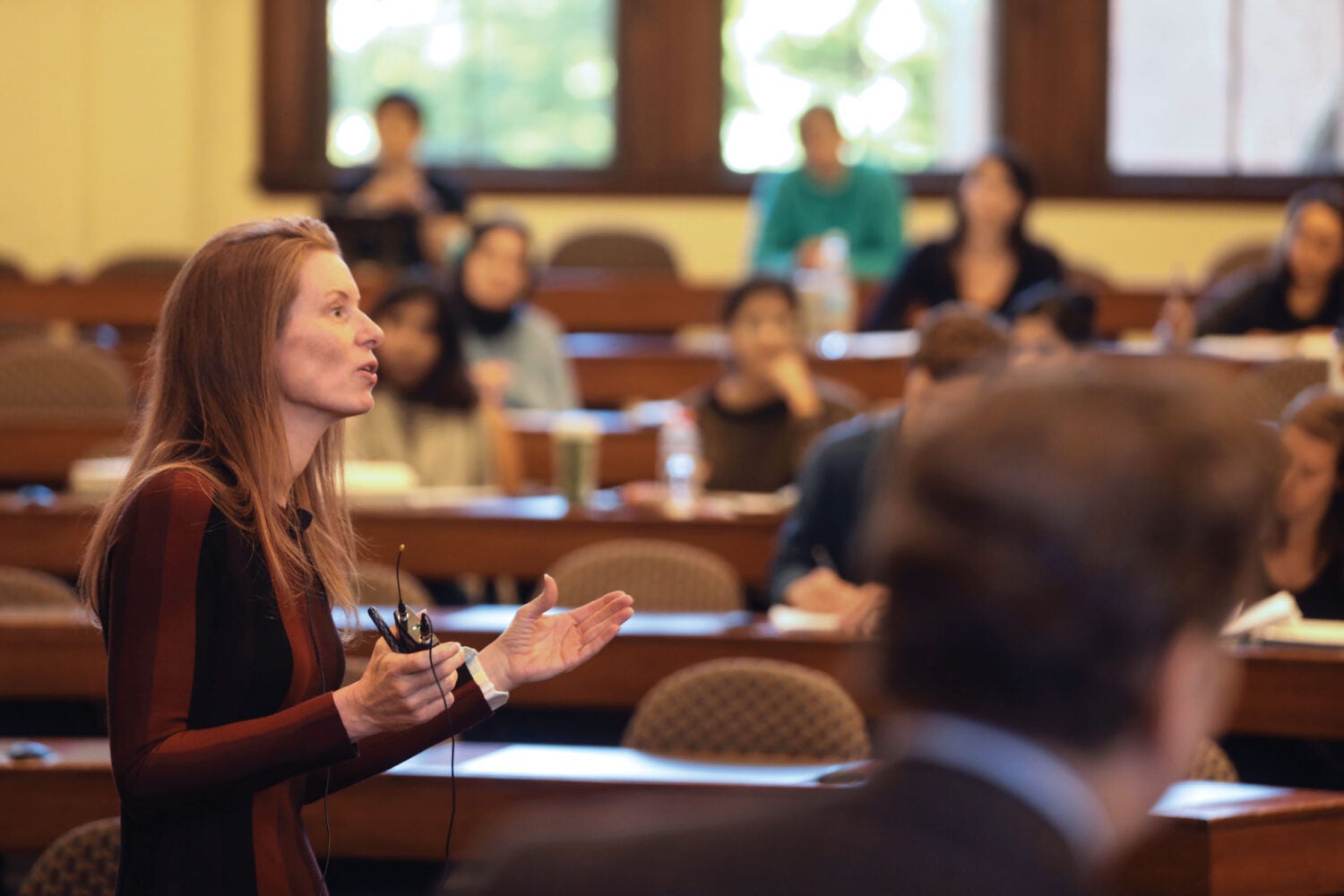For millions of people, social media is a quick way to keep up with the activities of a faraway grandchild or check out a neighbor’s vacation photos. Yet it can be equally effective when used for nefarious purposes. In 2018, news reporting revealed that Myanmar military officials had been using fake Facebook accounts with a collective 1.3 million followers to spread anti-Muslim propaganda for over half a decade, inciting violence against the country’s Rohingya minority. The accounts, which Facebook took down, have been globally condemned for their role in the forced migration of over 742,000 Rohingya.
This and a number of other scenarios, including Russia’s interference in the 2016 U.S. presidential election, raise the question: How can regulation prevent social media from doing serious harm? A new course in fall 2019, Social Media and the Law, took on that inherently complex question. Taught by Professor Noah Feldman and Monika Bickert ’00, lecturer on law, who also serves as Facebook head of global policy management, the course delved into the difficulty of crafting policy on topics that intersect with social media, including hate speech; terrorism, extremism, and incitement to violence; pornography, nudity, and harassment; and misinformation, polarization, and democracy. In addition, readings and discussions focused on the current legal environment; antitrust issues; the effectiveness of automated solutions; social media in China; and issues of privacy. The potential remedies of internal governance and the role of appeal processes and oversight were also considered. In fact, Feldman notes, he and Bickert met thanks to his work advising Facebook on the formation of its own content oversight board—the decision-making body that determines what is left up on the site and what is taken down.
“The course combines theoretical discussion of the right thing to do and different ways to look at an issue critically—all of those features that a good academic course should have—with the very applied consideration of, How does it work in real life?” says Feldman, whose scholarly interests include constitutional law and free speech. “A very exciting educational aspect of this course is that we don’t have to read an article to find out how something works in real life, because Monika is right there.”
“The course combines theoretical discussion of the right thing to do with the very applied consideration of, How does it work in real life?”
—Noah Feldman
Bickert joined Facebook in 2012 as its lead security counsel, advising the company on data security, and moved into her current role a year later. When she graduated from HLS in 2000, social media didn’t exist; in fact, she wasn’t even that interested in technology, she says. Instead, she pursued a career as a prosecutor, serving as assistant U.S. attorney in the Northern District of Illinois and as resident legal adviser at the U.S. Embassy in Bangkok. “I’m encouraged by the breadth of perspective students bring to class and their willingness to advocate positions that are likely different from their opinions,” Bickert says. “It makes for a more interesting conversation and helps us get deeper insights into the policy challenges social media companies face.”

Professor Noah Feldman
Enrollment in the class included students from a variety of countries, Feldman notes, which added to the range of perspectives. On the first day, the question was raised of whether a global social media company should have different content standards for free expression in different regions of the world. “One person from sub-Saharan Africa said that they should have different standards, due to the danger of First Amendment imperialism,” he says. Another, raised in Vietnam, described how highly his mother values free expression. “It was an incredible opportunity to see and hear perspectives you could gather by traveling around the world,” Feldman says, “but we had them all in real time, in the classroom.”
A native of Colombia, Isabella Ariza Buitrago LL.M. ’20 says that she was fascinated by the legal cases involving nudity, pornography and feminism-related issues. “I’ve learned that if a social media company doesn’t have a detailed policy around nudity, it’s a de facto porn site,” she says. “More broadly, it’s also been interesting to discuss the ways in which social media companies are more like a state or global entity than a corporation. Their policies govern so many relations. So, could they be considered a democracy?”
Before HLS, Princess Daisy Akita ’20 worked as a corporate strategy and development manager at Microsoft. “What fascinates me most is how the law will evolve alongside the advance of technology,” she says. An assignment to craft a hate speech policy made her realize just how challenging it can be not only to come up with a policy, but also to enforce it: “How do you ensure that your definition of terrorism prevents radicalization but doesn’t stop activists from taking a stand and sharing their story?” she asks. “It’s easy to discuss legal issues in a theoretical way, but there are so many questions that come up once you sit down to write a policy.” A location-specific approach, for example, doesn’t work when people are commenting on the same post from different parts of the world.
“I don’t know that I’m walking out of the class with all of the answers,” Akita adds. “If anything, I’m leaving a little more confused and a little more open to the gray.”
And that, she reflects, is no doubt education’s purpose—to open minds to the subtleties of the issues at hand to gain a full appreciation of their complexity.
“Does Facebook do good in the world?” Feldman muses. “I’m convinced the employees and senior management want it to, but whether you want it to be a force for good or it is are two different things. It’s a question we constantly discuss, and we do so politely, because one of the professors is from Facebook. But the topic is very much on the table.”
